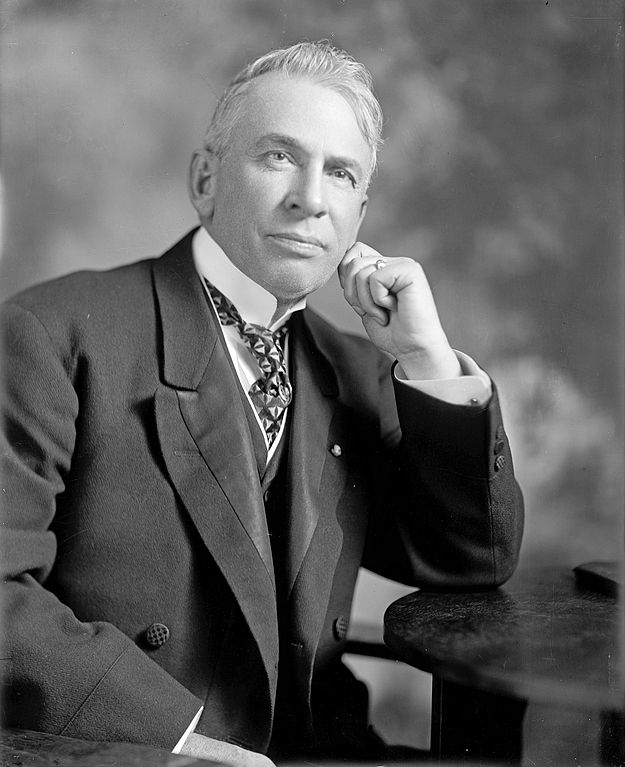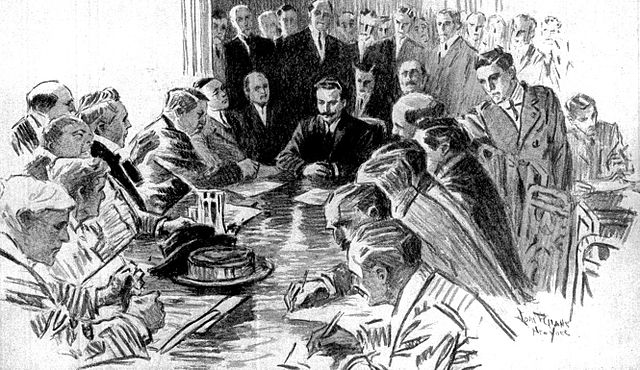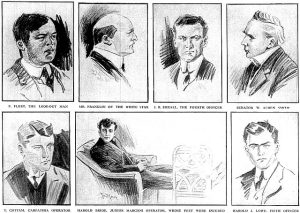
Unknown date (between 1905 and 1945)
Public Domain
The shocking news of the Titanic sinking had people on both sides of the Atlantic wanting an inquiry into how it happened. The United States would be the first to do so, but not without criticism from the British. U.S. Senator William Alden Smith, a Republican from Michigan, believed that rapid action was needed. He was also concerned that many of the surviving witnesses aboard Carpathia would disperse and head home. This led to his proposal on 17 April 1912 that an official inquiry be held on the sinking. President Taft concurred having lost his good friend and military advisor Archibald Butt in the sinking. Taft ordered a U.S. naval escort for Carpathia as well.
Smith along with fellow subcommittee member Francis G. Newlands (and other officials) quickly traveled to New York by train in order to meet Carpathia when it docked on 18 April in the evening. Smith, Newlands, and the other officials boarded Carpathia and served subpoenas upon J. Bruce Ismay and all the surviving officers requiring them to stay in the U.S. for the hearings which started the next day in New York. Survivors and other witnesses who had knowledge would also testify as well. The hearings would begin at the Waldorf-Astoria Hotel in New York and later be moved to Washington D.C. at the Russell Senate Office Building. The hearings, with many recesses in-between, would run for 18 days till May 25, 1912.

Public Domain (via Wikipedia)

Author: Louis Grant, The Graphic, 11 May 1912
Public Domain via Wikimedia Commons
The subcommittee was composed of seven senators (three Republicans and three Democrats) with Smith as chair. The composition was carefully chosen to include the various wings of the two parties. Members of the committee asked questions, but Smith personally handled the questioning of the chief witnesses. This led to friction within the committee as some felt he was trying to seize the limelight. The result was some members would only infrequently attend the hearings as there was little for them to do. Harsher criticism came from the British press and also the British government as well. Smith was not portrayed well and was called an opportunist. The British government (and the press as well) said the U.S. had no jurisdiction since this was a British ship. This conveniently forgot that White Star Line was owned by an American, J.P. Morgan. The British would hold their own inquiry much later after the American one had concluded.
Sources
Books
Behe, George TITANIC: SAFETY, SPEED AND SACRIFICE, Transportation Trails, Polo, IL 1997
Eaton John P. & Haas Charles, TITANIC TRIUMPH AND TRAGEDY, SECOND EDITION, W.W. Norton & Company, New York, New York, 1995 First American Edition
Lord, Walter, A NIGHT TO REMEMBER, Holt Rinehart and Winston, New York, New York, 1955. Multiple revisions and reprints, notably Illustrated editions (1976,1977,1978 etc)
Lord, Walter, THE NIGHT LIVES ON, Willian Morrow and Company, New York, New York, 1986 (First Edition)
Lynch, Don & Marshall Ken, TITANIC AN ILLUSTRATED HISTORY, Madison Press Books, Toronto, Ontario Canada, 1992
Wade, Wyn Craig. THE TITANIC: END OF A DREAM. Penguin Mass Market, 1992.
Internet
Encyclopedia Britannica, www.britannica.com/search?query=Titanic.
“Encyclopedia Titanica.” www.encyclopedia-titanica.org.
“The Titanic: Sinking and Facts | HISTORY.” HISTORY, 12 Mar. 2024, www.history.com/topics/early-20th-century-us/titanic
Titanic Inquiry Project – Main Page. www.titanicinquiry.org.









